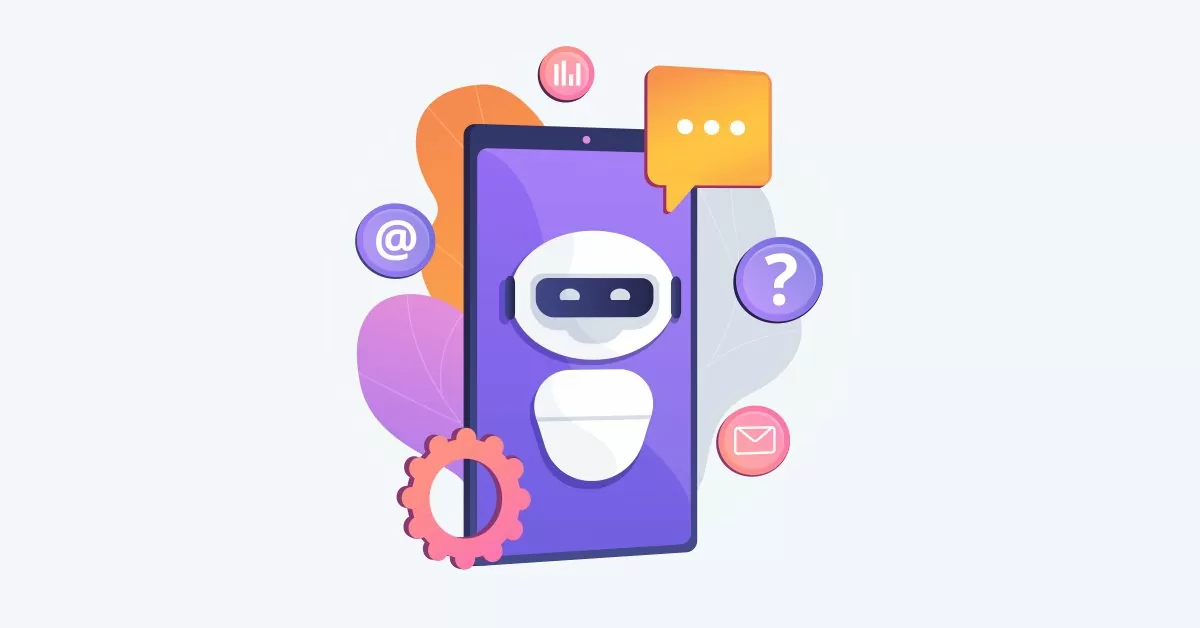Are you tired of spending countless hours answering the same customer inquiries over and over again? Do you want to improve your customer service without having to hire additional staff? Then, a chatbot might be the perfect solution for your business.
Chatbots are supporting companies in different industries to answer customer questions and learn by iterating human interaction.
Let’s explore why your business should consider implementing one.
Table of Contents
- So, what is a chatbot?
- Types of chatbots
- How do chatbots work?
- Why are chatbots important?
- Why chatbots?
- Advantages and disadvantages of chatbots
- What are the benefits of using chatbots?
- How are chatbots enhancing customer experience?
- Rosy much? There are also challenges with chatbots
So, what is a chatbot?
You’ve probably heard of the chatbot. But what is a chatbot?
A chatbot is an artificial intelligence program that can simulate human conversations through messaging applications, websites, mobile apps, or telephones.
Chatbots often use machine learning algorithms to improve their responses over time, making them more sophisticated and human-like.
They can be designed to perform a variety of tasks, such as:
- Answering customer inquiries
- Providing recommendations
- Or even acting as personal assistants
Chatbots save time and resources by automating tasks and providing personalized responses to customers. This makes them increasingly popular in organizations.

Types of chatbots
There are three types of chatbots: Basic Chatbots, Keyword Recognition Chatbots, and Contextual Chatbots.
All of these chatbots have different sophistication levels and requests that can be processed.
- The Basic Chatbots operate based on buttons and menus, providing users with a list of pre-programmed interactions.
These chatbots are similar to phone menus and only respond to the limited options provided. While Basic Chatbots are often used for FAQs, they do not utilize machine learning and can’t learn from user interactions.
Despite their simplicity, they can still be effective in providing users with quick and easy access to information. However, they may not be suitable for more complex tasks or inquiries that require more personalized responses.
- Keyword Recognition Chatbots match keywords from conversations to stored information in order to respond to users.
These keywords are typically programmed into the chatbot. When a user inputs a message that contains one of the keywords, the chatbot will respond with a predefined message or action.
Nevertheless, one of the challenges with these chatbots is that feedback accuracy can be threatened when there are similarly queried.
- Contextual Chatbots are the most advanced type of chatbots, utilizing machine learning (ML) to remember conversations with specific users.
Over time, these bots learn from several human interactions, improve their response accuracy, and provide user-tailored solutions.
These bots are intuitive and have the ability to understand the context of a conversation, allowing them to suggest service or product solutions that are specific to each user.
The use of contextual chatbots in Call Center Studio’s software reduces call traffic by around 60% with Google DialogFlow.
Contextual chatbots function in omnichannel, sharing information from one channel to another to complete a consumer’s query, thereby enhancing customer experience.
How do chatbots work?
In order to understand and respond to user inputs, chatbots use natural language processing (NLP), which involves analyzing and interpreting human language.
NLP allows chatbots to understand the intent behind a user’s message, even if it is phrased in an unconventional way. This is important because it enables chatbots to provide relevant and accurate responses to user queries.
Chatbots also use machine learning algorithms to improve their responses over time based on previous interactions. This means that the more a chatbot interacts with users, the more it learns and improves its ability to provide accurate and helpful responses.
Why are chatbots important?
Chatbots can provide round-the-clock customer service. They can quickly analyze customer queries and provide accurate responses. Thus, they save time and resources for businesses and enhance the customer experience.
Also, they offer personalized experiences and recommendations.
By providing valuable data on user behavior and preferences, chatbots can help businesses better understand their customers. In this way, businesses can identify areas for improvement in their products and services.
Chatbots handle a large volume of customer queries simultaneously without compromising the quality of service. They are cost-effective as they can significantly reduce the need for human customer service agents, saving companies money in the long run.
As a result, chatbots are important for businesses, and this importance is increasing. As technology evolves, chatbots will become even more effective and indispensable in meeting user needs.
Why chatbots?
Chatbots have become an increasingly popular tool for businesses looking to streamline their interactions with customers.
These automated systems streamline B2C interaction and enhance efficiency in resolving customer requests, improving customer experience, and minimizing operational costs.
One of the key benefits of chatbots is their ability to quickly and effectively resolve customer complaints. In fact, according to a recent report by MIT Technology, 90% of businesses have reported faster complaint resolution times when using chatbots.
But that’s not all.
Chatbots also provide businesses with valuable data that can be used to better understand consumer needs and preferences. Analyzing chatbot data can help businesses identify common customer issues and improve the overall customer experience.

Advantages and disadvantages of chatbots
Chatbots have several advantages, such as:
- Being available 24/7
- Providing quick responses
- Reducing human error
- Automating repetitive tasks
- Collecting important data
However, they also have some disadvantages, such as:
- Lacking empathy
- Being limited in their ability to interpret complex requests
- Potentially frustrating users if they can’t provide the desired information or assistance
Overall, chatbots can provide numerous benefits for businesses. Yet, it is important to consider the potential limitations and disadvantages of chatbots when implementing them in customer service or other contexts.
What are the benefits of using chatbots?
Chatbots offer several benefits, including:
- Cost savings
- Improved customer engagement
- Personalized experiences
- 24/7 availability
- Instant response times
They can also handle repetitive tasks, freeing up human resources for more complex work. Chatbots can reduce the need for human customer service agents.
You can integrate chatbots into various platforms. This means that you can reach customers on the platforms they are already using and provide assistance where they need it.
Moreover, chatbots can collect valuable data on customer interactions and preferences. You can then use this information to tailor your services to meet your customers’ needs better.
By leveraging these benefits, you can enhance your customer service, streamline your operations, and gain a competitive edge.
How are chatbots enhancing customer experience?
According to Salesforce data, 64% of agents with AI chatbots can spend most of their time-solving complex problems versus 50% of agents without AI chatbots.
With the aid of Google Dialogflow, chatbots can understand consumers through machine learning, match queries entered from any channel, and give the best-fit feedback.
This increases businesses’ efficiency and allows agents to focus on the more complex issues that require their attention.
Rosy much? There are also challenges with chatbots
While chatbots have numerous advantages, every business building a chatbot must consider some concerns. One of the significant challenges is security, which includes threats and vulnerabilities.
Threats include spoofing/impersonating someone else, tampering with data, and data theft. While vulnerabilities mean a bot is open to attacks if it is not well maintained, has poor programming, or lacks encryption.
To mitigate these threats, you need to implement end-to-end encryption, secure protocols, robust user identity authentication, and authorization.
Also, a lack of emotional touch toward a consumer could be a turn-off. Google’s Dialogflow sentiment analysis identifies the user’s attitude as positive, negative, or neutral by analyzing their input.
Moreover, when a chatbot starts providing inaccurate or insufficient replies, it should offer the option to switch to a human agent. The system can prompt the user to speak with an agent if needed.
Businesses are adopting Chatbots as it cuts operational costs by 30%. And with a projection that businesses will handle 85% of customer interactions with chatbots by 2021, making it logical to enhance customer experience through bots.
In summary, chatbots offer several benefits to businesses. They not only help businesses save costs but also improve customer engagement and personalized experiences, which can enhance the overall customer experience.
However, businesses need to consider the potential limitations and disadvantages of chatbots when implementing them in their systems.
Our team can help you with this process.




